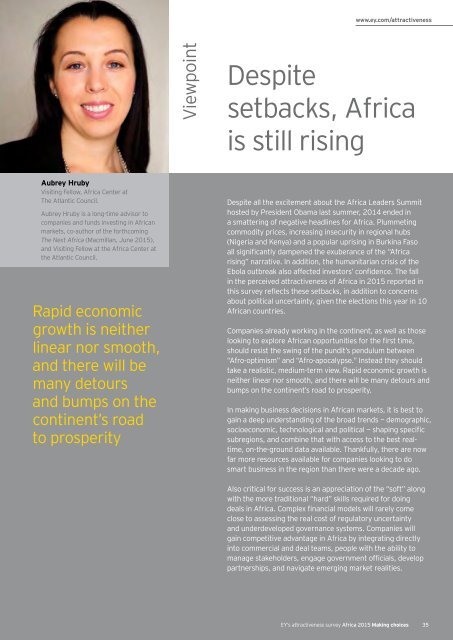Perception How foreign investors see AfricaA quarter of respondents to our <strong>survey</strong> highlighted corruptionas a big barrier to investment in Africa. Many Africancountries perform badly in Transparency International’sCorruption Perceptions Index 2014. This highlights the needto enforce stringent anti-bribery and corruption initiatives inAfrica. Likewise, companies need to establish robust monitoringof processes and decisions to identify and manage potentiallycorrupt practices.Tax administration also needs to be simplified, with a focuson harmonizing procedures across the continent as much aspossible. An average company in Africa has a total tax rate of46.6%, considerably higher than the global average. Tax-filingtypically takes 317 hours per year, the second-highest of anyregion and, again, well above the global average. To complywith tax obligations, an average company makes 36.2 paymentsin Africa, compared with 25.9 globally. While the taxationenvironment has improved over the last 10 years, with the totaltax rate declining by 22.5% and average time-to-comply down byalmost 30 hours, there is still scope for improvement. Only 9%of African economies already have electronic systems for filingand paying taxes. 54 Many governments in Africa are consideringstrengthening corporate tax relief and incentives to woo investors.Finally, Africa’s employers and employees need more flexibleemployment rules. Labor laws in many African countries arerestrictive in comparison with other regions. According to theWEF’s African Competitiveness Report 2013, the SSA regionscores 4.26 indicating that laws are more restrictive than inSoutheast Asia, which scores 4.61. Labor regulations areparticularly rigid in North African countries, with labor marketsin Egypt (146th) and Algeria (147th) ranking among the leastefficient in the world. 55Investing in education and training to enhanceworkforce skillsBy 2040, Africa is expected to have the world’s largest laborforce, ahead of both India and China. However today, companiesoperating in Africa still find it difficult to find suitable workers.Education levels remain relatively low: in SSA, the secondaryschool enrollment rate is only 40%. 56 The United NationsEducational, Scientific and Cultural Organization (UNESCO)forecasts that Africa will be home to half of the world’s illiteratein the years ahead, and that resulting constraints on skilldevelopment will harm business and wealth creation. 57 There isalso a large mismatch in skills that job seekers offer and thosesought by employers.54 Paying Taxes 2014: The Global Picture — Africa, World Bank, November 2014.55 The Global Competitiveness Report 2013–14, World Economic Forum, October 2013.56 “Global Agenda Council on Education 2014–2016,” World Economic Forum website,www.weforum.org, accessed 17 March <strong>2015</strong>.57 “Education and skills development challenges to hurt Africa’s business and wealth creation,”CNBC website, www.cnbc<strong>africa</strong>.com, accessed 18 March <strong>2015</strong>.African governments need to reshape curricula at secondaryand tertiary institutions to ensure they meet the needs of thelabor market. More technical and vocational training programsare required to equip African workers with high-quality skills thatbusiness needs.In turn, firms will need to take responsibility for skills developmentby investing in workforce training. To reduce overdependenceon expatriate workers, companies must foster skills transferfrom expatriates to local staff. Sourcing employees strategically,managing a diverse talent pool spread across a large area, andbeing able to move talent efficiently across the continent will becritical for success.Learning to manage peopleA growing war for talent is emergingin Africa. Some 70% of African firms<strong>survey</strong>ed by <strong>EY</strong> are recruiting to supporttheir growth ambitions on the continent,yet vacancies are taking longer to fill andemployee turnover is high. These areamong the key findings of the secondedition of <strong>EY</strong>’s Sub-Saharan Talent Trends andPractices Survey.The <strong>survey</strong> found that technical and professional skills areespecially in demand. Over a third of companies said theirneed for technical and professional skills was likely to growover the next 12 months.Over 300 companies across 23 African countries, togetheremploying more than 400,000 workers, participated in the<strong>survey</strong> — giving a unique and comprehensive view of humanresource trends across the subcontinent.Even as competition for talent intensifies in Africa, labormarkets are expected to become more rigid. Three-quartersof companies expect labor market regulation to increase, yetonly a third of organizations find labor market institutionseffective. Nearly two-thirds of respondents believe that tradeunion activity or collective employee action is increasing intheir country.Clearly, organizations need to become more deliberate in howthey plan for, attract and retain staff. To secure the talent theyseek, they will need to make training and career developmentpart of their brand, developing processes to monitor and rewardemployee performance and ensure management continuity.34 <strong>EY</strong>’s <strong>attractiveness</strong> <strong>survey</strong> Africa <strong>2015</strong> Making choices
www.ey.com/<strong>attractiveness</strong>ViewpointDespitesetbacks, Africais still risingAubrey HrubyVisiting Fellow, Africa Center atThe Atlantic Council.Aubrey Hruby is a long-time advisor tocompanies and funds investing in Africanmarkets, co-author of the forthcomingThe Next Africa (Macmillan, June <strong>2015</strong>),and Visiting Fellow at the Africa Center atthe Atlantic Council.Rapid economicgrowth is neitherlinear nor smooth,and there will bemany detoursand bumps on thecontinent’s roadto prosperityDespite all the excitement about the Africa Leaders Summithosted by President Obama last summer, 2014 ended ina smattering of negative headlines for Africa. Plummetingcommodity prices, increasing insecurity in regional hubs(Nigeria and Kenya) and a popular uprising in Burkina Fasoall significantly dampened the exuberance of the “Africarising” narrative. In addition, the humanitarian crisis of theEbola outbreak also affected investors’ confidence. The fallin the perceived <strong>attractiveness</strong> of Africa in <strong>2015</strong> reported inthis <strong>survey</strong> reflects these setbacks, in addition to concernsabout political uncertainty, given the elections this year in 10African countries.Companies already working in the continent, as well as thoselooking to explore African opportunities for the first time,should resist the swing of the pundit’s pendulum between“Afro-optimism” and “Afro-apocalypse.” Instead they shouldtake a realistic, medium-term view. Rapid economic growth isneither linear nor smooth, and there will be many detours andbumps on the continent’s road to prosperity.In making business decisions in African markets, it is best togain a deep understanding of the broad trends — demographic,socioeconomic, technological and political — shaping specificsubregions, and combine that with access to the best realtime,on-the-ground data available. Thankfully, there are nowfar more resources available for companies looking to dosmart business in the region than there were a decade ago.Also critical for success is an appreciation of the “soft” alongwith the more traditional “hard” skills required for doingdeals in Africa. Complex financial models will rarely comeclose to assessing the real cost of regulatory uncertaintyand underdeveloped governance systems. Companies willgain competitive advantage in Africa by integrating directlyinto commercial and deal teams, people with the ability tomanage stakeholders, engage government officials, developpartnerships, and navigate emerging market realities.<strong>EY</strong>’s <strong>attractiveness</strong> <strong>survey</strong> Africa <strong>2015</strong> Making choices35



